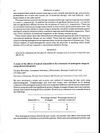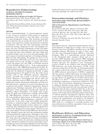May 2021 in “Journal of the Endocrine Society” A woman developed male characteristics after using unregulated hormone therapy.
 October 2012 in “Sri Lanka Journal of Diabetes Endocrinology and Metabolism”
October 2012 in “Sri Lanka Journal of Diabetes Endocrinology and Metabolism” A rare ovarian tumor caused hair loss in a post-menopausal woman, which almost completely stopped after surgery.
 4 citations,
January 1994 in “Journal of hepatology”
4 citations,
January 1994 in “Journal of hepatology” Cyclosporine A therapy changes sex hormone levels differently in pre-menopausal and post-menopausal women with primary biliary cirrhosis.
 28 citations,
October 1998 in “Baillière's clinical endocrinology and metabolism”
28 citations,
October 1998 in “Baillière's clinical endocrinology and metabolism” Testosterone replacement may help post-menopausal women with androgen insufficiency, but more research is needed on its benefits and risks.
 49 citations,
January 2003 in “Clinical and Experimental Dermatology”
49 citations,
January 2003 in “Clinical and Experimental Dermatology” The document concludes that post-menopausal frontal fibrosing alopecia is a poorly understood condition that does not respond well to common treatments.
 May 2023 in “The journal of sexual medicine”
May 2023 in “The journal of sexual medicine” Ovarian Hyperthecosis caused hypersexuality in an older woman and was successfully treated with surgery.
April 2020 in “International journal of reproduction, contraception, obstetrics and gynecology” A postmenopausal woman with hair loss and hirsutism improved after surgery to remove an ovarian tumor.
 22 citations,
February 2014 in “Arquivos Brasileiros De Endocrinologia E Metabologia”
22 citations,
February 2014 in “Arquivos Brasileiros De Endocrinologia E Metabologia” An 81-year-old woman's severe male hormone symptoms were caused by an ovarian tumor, which was treated with surgery.
 2 citations,
April 2016 in “Más dermatología”
2 citations,
April 2016 in “Más dermatología” The supplement with Serenoa repens and Pygeum africanum significantly increased active hair growth and decreased rest phase hair in post-menopausal women with hair loss, with only mild digestive side effects.
 31 citations,
May 2012 in “European Journal of Dermatology”
31 citations,
May 2012 in “European Journal of Dermatology” Menopause affects hair and skin; more research needed for treatment.
 22 citations,
March 2004 in “Dermatology”
22 citations,
March 2004 in “Dermatology” Topical estrogen helps hair growth in menopausal women with no major side effects.
 12 citations,
March 2017 in “Journal of obstetrics and gynaecology Canada”
12 citations,
March 2017 in “Journal of obstetrics and gynaecology Canada” Testosterone therapy can modestly improve sexual function in menopausal women but should be used cautiously and is not recommended for routine measurement in sexual dysfunction or hirsutism.
 January 2008 in “Dermatology Online Journal”
January 2008 in “Dermatology Online Journal” Hormonal therapy like cyproterone acetate and spironolactone may help female hair loss, but more research is needed, especially for pre-menopausal women.
 21 citations,
December 2012 in “Maturitas”
21 citations,
December 2012 in “Maturitas” Testosterone implants in women require pharmacological dosing to be effective and are generally safe and well-tolerated.
 February 2024 in “Endocrinology and Disorders”
February 2024 in “Endocrinology and Disorders” Balanced hormones are crucial for women's health, and can be managed with lifestyle changes or hormone therapy if needed.
November 2021 in “CRC Press eBooks” Female androgenic alopecia causes hair thinning in women, especially after menopause, and affects their mental well-being.
 5 citations,
April 2019 in “Journal of The American Academy of Dermatology”
5 citations,
April 2019 in “Journal of The American Academy of Dermatology” Frontal Fibrosing Alopecia may be a complex condition linked to hormonal changes in women, not just a form of Lichen Planopilaris.
 6 citations,
January 2017 in “British Journal of Dermatology”
6 citations,
January 2017 in “British Journal of Dermatology” Frontal fibrosing alopecia is a scarring hair loss condition mainly affecting older women, with no known cause and treatments that may help stabilize hair loss.
 14 citations,
January 2008 in “Dermatology Online Journal”
14 citations,
January 2008 in “Dermatology Online Journal” Hormonal therapies like cyproterone acetate and spironolactone may help some women with hair loss, but finasteride 1mg is not useful, and the effectiveness of other treatments is still unclear.
 1 citations,
May 2017 in “Maturitas”
1 citations,
May 2017 in “Maturitas” The document concludes that managing health issues like menopause, cardiovascular risk, and hair loss is crucial for promoting longevity in aging women.
 4 citations,
January 2015 in “Endocrinology & metabolic syndrome”
4 citations,
January 2015 in “Endocrinology & metabolic syndrome” Testosterone can cause acne and male-pattern baldness, affects hair growth in men and women, and makes male skin more sensitive.
 1 citations,
January 2017 in “Current Dermatology Reports”
1 citations,
January 2017 in “Current Dermatology Reports” Early baldness in men may indicate risks for obesity, metabolic syndrome, insulin resistance, and heart disease, similar to women with PCOS. Alopecia areata is often linked with autoimmune diseases and mental health issues. Certain hair disorders are due to genetic issues, and chemotherapy can cause hair loss through specific biological pathways. Iron deficiency's link to hair loss is still disputed.
1 citations,
January 1988 Topical DHEA safely increases skin oil production.
 July 1989 in “British Journal of Dermatology”
July 1989 in “British Journal of Dermatology” Minoxidil helps increase hair growth and density in people with hair loss, with higher concentrations giving better results.
 August 2003 in “Journal of Investigative Dermatology Symposium Proceedings”
August 2003 in “Journal of Investigative Dermatology Symposium Proceedings” The document did not provide enough information to summarize the causes of hair loss in pre- and postmenopausal women.
7 citations,
January 2019 in “Journal of clinical medicine research” Menopause causes significant changes in the vaginal introitus, but less so in the labia majora, which may lead to symptoms of vaginal atrophy.
 April 2020 in “Journal of the Endocrine Society”
April 2020 in “Journal of the Endocrine Society” A woman's severe hirsutism was caused by Leydig cell tumors in her ovaries, which improved after surgery.

Sunekos® effectively improves labia majora appearance and is well-tolerated.
Linalool in personal care products may worsen frontal fibrosing alopecia by damaging hair follicle stem cells and triggering harmful immune responses.
 September 2013 in “Hair transplant forum international”
September 2013 in “Hair transplant forum international” The document says doctors should identify and treat Frontal fibrosing alopecia medically before considering surgery, as treatments often don't work well.























